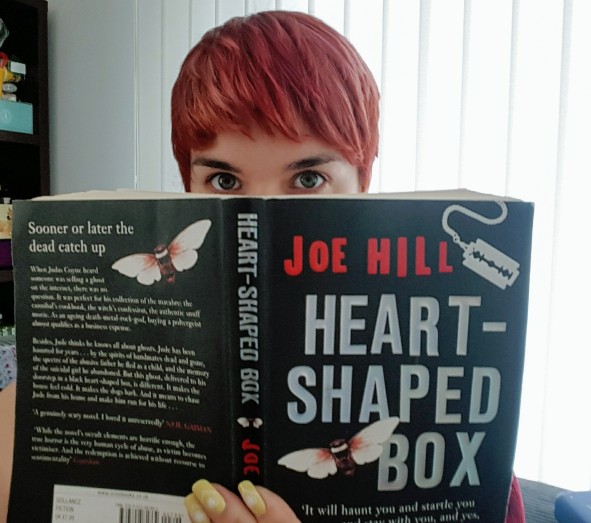This was the latest read for book club, and was shortlisted for the Bailey’s Women’s Prize for Fiction in 2014. Continue reading
The Glorious Heresies – Lisa McInerney


This was the latest read for book club, and was shortlisted for the Bailey’s Women’s Prize for Fiction in 2014. Continue reading

Like many, many people, I’ve been watching the Channel 4 adaptation of The Handmaid’s Tale recently; and, like many, many people, it has inspired me to re-read the book.

When I first saw the film of The Princess Bride, I was just a kid and I… didn’t get it. I didn’t pay attention; the SFX were terrible, the storyline implausible, and I just… I didn’t get it.
A few years later, when I had a better attention span and sense of irony, someone (probably my dad) got me to watch it again and SNAP. That was it… I fell in love with this sublime and ridiculous story, instantly joining the legions of cult fans. I always meant to pick up the book, too, but – like so many I’ve read in this year of the insane reading target – only got around to hunting a copy down recently.
Long blog post short – the book is just as good as the film. If you adore one (like me), you’ll adore the other. If you think one is puerile and all a bit stupid really… well, you’re not going to find much to enjoy in the other. A sweeping, grand adventure, the story follows the epic love story of Buttercup and Westley; the trials, the tribulations, the miracles and downfalls, all with frequent interruptions from the author of the book, who reassures the readers each time that he is only telling us ‘the good bits’ of the story. To my delight, I found that the most iconic lines from the film are lifted directly from the book (that word really doesn’t mean what he thinks it means), and although I’m usually firmly in ‘the book is always better’ camp, when a book has been so purely adapted for screen as in this case, it’s like recognising a well loved friend in a slightly different haircut. It’s still them!
Love love love this book!
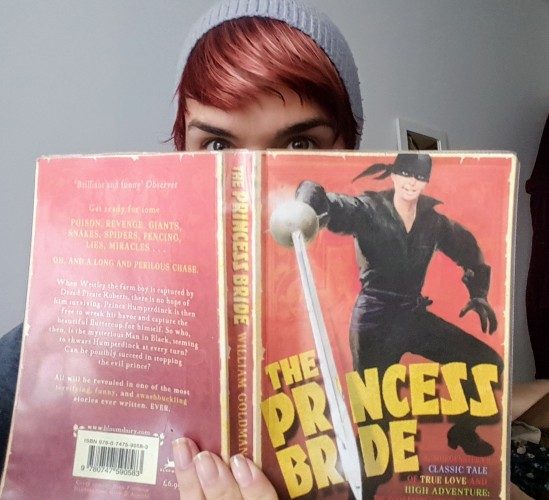

I’m part of a book club at work (because of course I am) and Homegoing was the book selected for this month. It definitely prompted some interesting discussion – prompted by the narrative, we covered fluid versus fixed identity, and talked about the question of knowing who you are based on knowing where you come from. We talked about the interesting structure of the narrative – it follows several generations, each character only getting one chapter before time skips on and we meet the children (then their children, and their children’s children) – I personally found it a little jarring at first, because I wanted closure for each character, but by the end of the book Gyasi has built a picture of a whole family tree, and it feels complete again.Many of us in the room had learned things – about Ghana and the Gold Coast, or about the slave trade and the historical basis for this work of fiction – as you can tell, there was a lot to talk about!
The narrative itself starts with one woman, Maame, and her two daughters, who are born to different fathers and raised in very different circumstances. Each chapter then takes turns switching between the two branches of the family tree, introducing the next generation each time. The timeline stretches from the beginnings of the western-run slave trade in Ghana all the way up to modern day America, and it’s breathtaking to see how these awful crimes that were committed hundreds of years ago halfway across the world echo down the generations to have impact still today.
Honestly, I could probably write several essays about this book (it would make a good book for a literature class, actually!) but rather than bore you all, I will simply say this: Homegoing is well worth reading. I recommend taking your time, making heavy use of the family tree at the front of the book, and being ready for some emotional impact – there are some horrors described that don’t make for easy reading. But absolutely read it – if only for the fascinating conversations it will provoke.
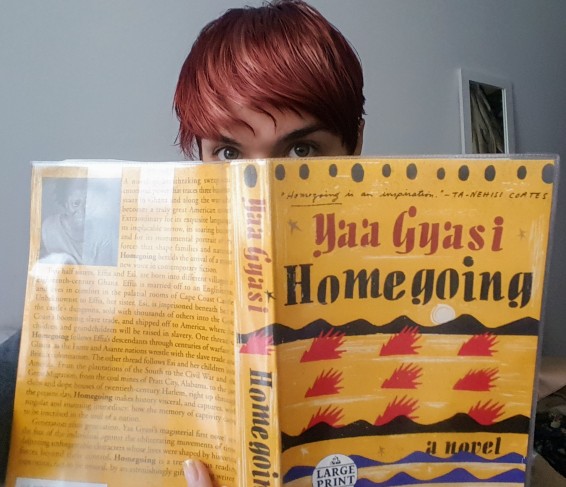

This was another birthday gift from the ever-generous Book Fairy (she spoils me rotten, I swear) and is deliciously unsettling. A deceptively gently-paced psychological thriller/horror, the house at midnight is set and centred around a large old country manor, inherited by the protagonist’s best friend. Lucas – the best friend – loses his beloved uncle to suicide, and when he inherits his house and art collection, he insists to his close-knit circle of friends that they treat it as a home-from-home.
Joanna, the protagonist, has always wondered if there might have been more to the friendship with Lucas that began at university, and she is nervous about how his sudden bereavement and windfall might affect the dynamics of the group. How can it not change things between them? Still, she rocks up, along with everyone else, for New Year’s, and it seems that she and Lucas are as close as ever. There’s a weird vibe, about the house, though – something about the mural on the ceiling, or the settling noises of the house in the dark and the quiet…
The story takes place over the course of a year, and I did not want to read it after dark! It focuses more on the interpersonal than any overtly ‘boo ghosty’ or ‘argh violent’ type of horror narrative – I’ve always preferred that kind of horror, to be honest. Think Sixth Sense as opposed to Paranormal Activity kind of feeling.
Insidiously creepy and pleasurably unsettling, and full of interesting and flawed characters.
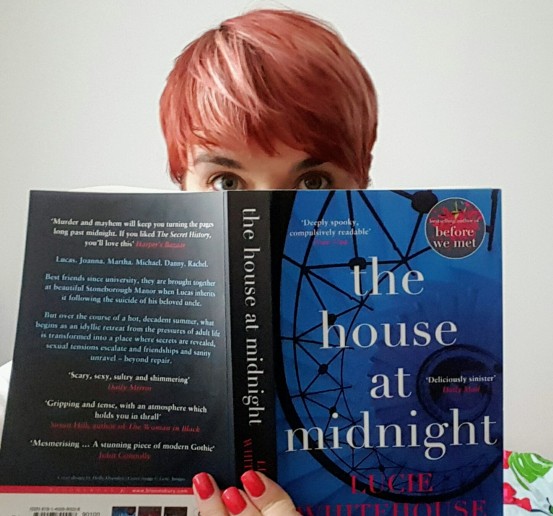

I first read this book more than ten years ago. (Man, I’m getting old…!) I can’t remember what it was about it that caught my eye first, but it’s become a fond favourite. I don’t re-read very often, but this understated little gem is one that I have come back to four or five times over the years, which in my eyes is a big seal of approval.

Each time I pick it up, I remember that I loved it, but think of it as a nice light read, forgetting that it actually packs quite an emotional punch! Tessaro writes such a believable main character – she’s incredibly relatable, without being ~~Relatable!!1!~~ (i.e. Manic Pixie Dream Girl or the Cool Girlfriend tropes) – Louise, the protagonist, is realistic and someone I remember identifying strongly with – even as a young teenager the first time I read it.
Louise is decidedly no longer twenty two. She is married, and an actress (well… she’s working in the box office right now, but she’s an actress really…) and although she just fine, she’s not exactly what she would call elegant. In her own eyes, she is certainly no Audrey Hepburn. So one day, when she stumbles across an A-Z of style written by a French fashion expert, entitled with one clean word – Elegance – she knows she’s found a gem…
The narrative follows Louise as she attempts to apply the lessons of Elegance to her life. Taking it often as gospel, and sometimes rebelling mutinously, the changes – small at first – begin to snowball. Hijinks certainly do ensue, but this is what I forget between each read; that it is a very funny book in places, and quite light to read (there’s something a bit Bridget Jones-esque about the idea of a hapless fashion-unconscious married woman trying to religiously follow a guide to elegance in her life), but the narrative never veers into slapstick, as it easily could. Instead, Tessaro effortlessly works in moments of pure pathos; honestly, my heart just ached for this fictional woman. Even though I’d already read the book a bunch of times and knew what was going to happen.
There are two or three key scenes I’m thinking of – I don’t want to describe them because a) spoilers and b) the author actually describes them much better in the book anyway – where I could so clearly see Louise in my mind’s eye. I could feel what she was feeling, and I wanted to wrap my arms around her and be gentle with her and tell her that it’s all going to be ok. The vulnerability of Tessaro’s writing is absolutely breathtaking.
Basically, I love this book and I love the main character and I hope you love them too.
(If you don’t, don’t tell me because it would break my heart just a little bit.)
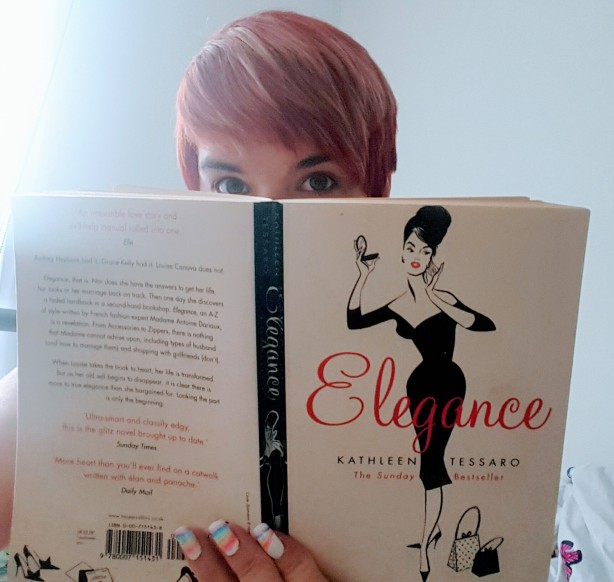

To open this post I am going to borrow a phrase from an awesome woman and wonderful children’s TV presenter I did some work for a few years back.
Ahem.
CRIKEY PYJAMAS!!!!!!!!

Honest, you guys, hooooly macaroni was I not expecting this book. It was a birthday gift from the wonderful Book Fairy (thank you darling!) and Heavens to Murgatroyd I wasn’t completely ready for it!
Life in a Fishbowl looks like it might be very silly. I wondered, actually, if it mightn’t be the same sort of absurd/sublime that The 100 Year Old Man was… BUT IT ISN’T.
Fair warning – and many, many trigger warnings – this book covers such light and happy subjects as terminal illness, amnesia, euthanasia, post-truth media entertainment, exploitation, online vs. offline identity, and the ethics/value of human life/selling human life/selling human life if it’s your life you’re selling.
Oooooooooookay then.

The basic premise is this – the protagonist, Jackie, is a teenage girl with a relatively normal life. That is, until her dad, on being diagnosed with aggressively terminal cancer, attempts to sell the remainder of his life to the highest bidder (to help pay for the inevitable medical bills and support his family when he’s gone). If that’s not enough, it turns out the the highest bidder is, in fact, a TV station who wants to make a reality TV show out of Jackie’s family during her dad’s final days. The nation (of course) tunes in avidly to watch a dying man and his family.
This is a YA book – emphasis on the young adult, here, as obviously there are plenty of themes which may not be suitable for younger readers. It covers a lot, and the author does come obviously down on one side of a fairly contentious ethical argument, which feels a teensy bit preachy at times (to me anyway) – but really, it was a well written and incredibly gripping story. As a reader, you guiltily identify with the audience in the book, hungrily voyeuring on Jackie and her family in their grief – you want to know what happens, but you’re also on Jackie’s side in resenting the intrusion and wishing her and her family some privacy and dignity. It’s a really interesting dynamic to experience as a reader, and it prompts some uncomfortable self reflection through the use of the patently absurd – kind of like The Hunger Games, actually. Like – I don’t really believe that a TV show following a dying man 24 hours a day up to his death would be commissioned, just like I don’t really believe that a show where kids fight each other to the death would be… but it’s juuuust close enough to reality to make for some extremely pointed social commentary.
Ultimately, this was a very griping narrative, and I loved what the book had to say about identity and community. At times I thought it was a tiny bit over packed with ISSUES, and at times I felt that the author was making their ethical argument at the expense of the narrative… but I read avidly, and (after an appropriate break to let my heart rate slow down!) I will probably read it again. Some extremely interesting food for thought and possible discussion points.
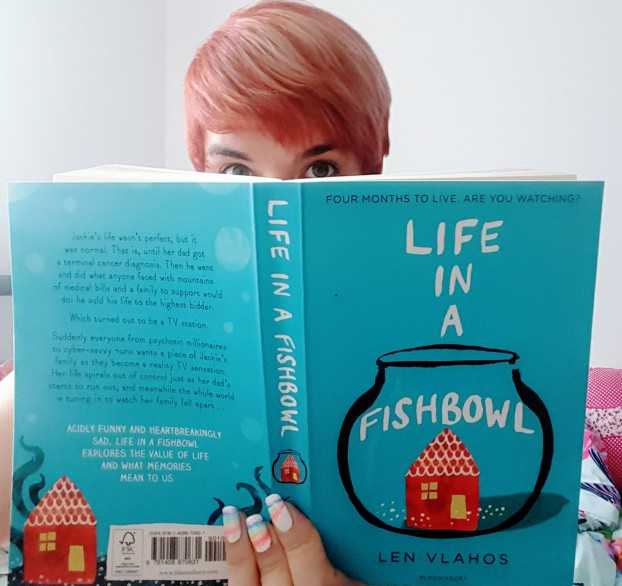

This book – which title takes up almost half of my whole blog post! – was another prize from Literary Bingo a few months ago, and has been sitting on my TBR pile ever since. I has no idea what to expect – I hadn’t really chosen the book myself, but the cover looked interesting…
Whatever I was expecting – it wasn’t that!
Completely absurd and delightfully batty, the story follows Allan Karlsson, starting with the moment he escapes out of the window of his nursing home on the day of his 100th birthday party. The narrative meanders along at a decent pace from there – never going quite where you expect it to go – and taking in much of Allan’s past as it goes. There’s 100 years of it, after all!
This is another one which hops around in time, but honestly, the whole thing’s so topsy-turvy that that’s hardly the jarring experience I’ve found it to be in some other books. What the style did remind me of – weirdly enough – was what I wished Catch-22 was. By this I mean the absurdist tone; one of my biggest struggles with Catch-22 (which longtime/regular readers my recall I didn’t actually ever finish) was feeling like I was having the whole surrealist point – WAR IS ABSURD! ISN’T WAR AN ABSURD THING? IT’S SO ABSURD AND SURREAL HOW HUMANS KILL EACH OTHER!!!!1!!!! – shoved in my face over and over at the expense of the narrative. Jonasson’s novel, in contrast, made some of the same kinds of points through similar methods, but at about a billionth of the volume. The seed of serious reflection is gently planted in your mind, and softly watered with humour and antics… instead of being bludgeoned in the face with the point.
And it is the same point! Somehow, this silly story about a grumpy old man’s adventures (and how he remembers his past adventures as a less grumpy, less old man) makes a subtle and clever point about the absurdity of global politics, war, and how human beings treat each other when they stop thinking of each other as human beings and start thinking of them as part of a system.
Of course, if you don’t want to think about all that – and it can be rather tiring to think about all that, admittedly – you can simply enjoy the incredibly improbable and delightful story!
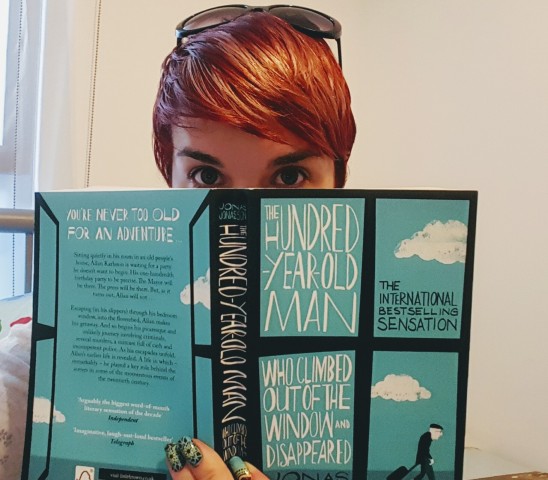

It’s been a mental few weeks. I’ve had a birthday, had my phone stolen, had a pretty horrid bout of illness… it’s all been a bit up and down! I haven’t had quite as much time or energy for reading as I’d have liked, and blogging therefore fell off the bottom of my priorities list for a couple weeks.
Sorry ’bout that.

Anyway, the good news is that I got a bunch of books for my birthday (yay! What a lucky girl I am!) and convalescing is a good time to be reading, so now that I’m properly back in the swing of things, I should be able to get enough posts going to get back to my normal twice-a-week schedule.
Without further ado, then…
This was recommended to me by a friend as a fantasy series I’d probably enjoy, and going by the first instalment, my friend was not wrong! It’s a nice chunky paperback – really gives you plenty of story to get stuck into – with a unique style that’s kind of a mashup of steampunk/Victoriana, fantasy, crime/mystery/heist type thing… really, it’s pretty cross-genre, which is really enjoyable. It could be described as YA, I guess… but I would think it’s aimed at more of an adult audience (although it’s definitely PG-13).
A couple of things that took me a while to get used to:
Lynch hops around in timelines – like, a lot. The whole book was like mini-cliffhanger after mini-cliffhanger; you’d get a few chapters into one era, the main characters would have enough time to get deep into a ~*situation*~…. and suddenly it would be ten years earlier, only for the cycle to repeat itself! It was a bit jarring at first, but, like in The Watchmaker of Filigree Street (whose author changes character perspective rather than time), once you get used to it it really adds to the narrative thread, as the simultaneous storylines support and develop each other.
The other slightly grating thing was a world-building element the author uses to make the world of Locke Lamora sufficiently ‘other’ than the real one in which we live. I’m not going to say too much about this, in case you read the book and completely love the device I mean (or just don’t even notice it)… I don’t want to shatter the illusion for anyone. I will say this though – when the element was first introduced, I immediately suspected that this would be a question we never really get answered in canon. It’s not integral to the plot, or maybe it doesn’t need answering, and it’s just a nice imaginative twist of decoration… but (slight spoiler-ish alert) it doesn’t get answered. At least not in the first book – maybe Lynch is playing the long game.
Anyway, neither of these two small niggles were anywhere near enough to stop me devouring The Lies of Locke Lamora, and getting the next two in the series from the library. Fair warning; the series isn’t complete yet – but the next book is due this year, so hopefully this won’t be another Rothfuss on our hands. Yeah, Rothfuss… I’m looking at you – again!
Really well-constructed and enjoyable first book. Can’t wait for the rest of the story!
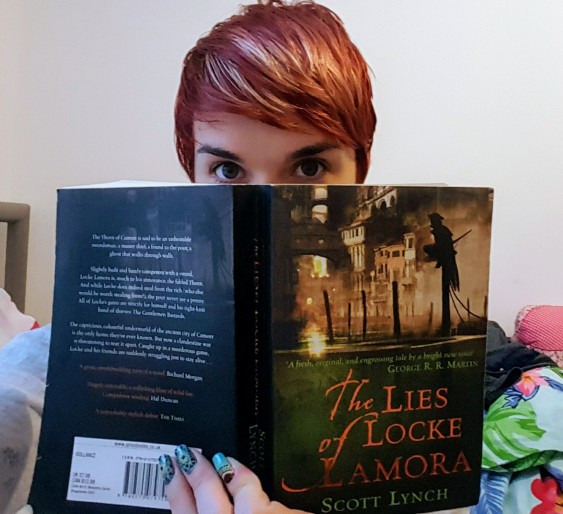

Generally speaking, horror is not really my jam. I prefer my ghost stories poignant and ethereal, usually, and – notwithstanding the odd dystopian fiction or political satire – I tend to gravitate more towards happy and fanciful rather than scary and dark. Especially when we’re talking about books – the last couple of horror-type novels I’ve read have just not hit home at all; The Wasp Factory and The Loney, as acclaimed as they both are, didn’t strike a chord with me at all, and I was left thinking that perhaps horror genre literature just isn’t for me.
So, when someone recommended Heart-Shaped Box by (successful in his own right) son of Stephen King, I have to confess it slipped to the bottom of the to-read list a few times. I’m making a conscious effort this year to take recommendations (plus, with a target of 250 new books read in 2017, I kinda need recommendations!) so I didn’t ignore it entirely, but I was ready to encounter either gratuitousness or yet another narrative that I simply didn’t get.
I do so love being proved wrong by a good book!
I’ll elaborate. The thing I tend to not enjoy about horror in films is the gratuitous nature. Gore by the bucket load, the evillest evil the human mind can think of, things that go bang or boo and can’t be beaten, ever, and not a sliver of light or hope anywhere… simply for the sake of it. The point is to scare, to unsettle, or to gross out… not as part of the story, but just for the sake of scaring, unsettling, and grossing out. They leave me with a nasty taste in my mouth and a distinct feeling of being cheated out of a story (complete tangent, here, but this is why I hate the film of A Woman in Black so much, because they took an amaaaaazing play with a brilliant story and an incredibly clever use of multiple roles, minimal props and one re-usable set and turned it into a story-less scare-fest that made me want to sleep with the light on).
Against my expectations, then, I actually loved Heart-Shaped Box. It’s definitely horror… it’s not a nice ghost story about love lasting through death, or a kooky fantasy novel where creatures of dark are just as complex a mixture of good and evil as people – it’s proper horror, with a malevolent ghost and some thoroughly unlikeable living people. The set up is this: the main character, an ageing metal/rock star who collects the macabre (a serial killer’s letters, an actual hangman’s noose, etc blah blah) buys a ‘ghost’ – the ghost is apparently attached to a suit belonging to the dead man, and said suit duly arrives, folded neatly in a black heart-shaped box. As you can guess, dude gets a little more than he’d bargained for, and scary hijinks ensue.
What kept me turning the pages, though (sometimes reading through my fingers, I’ll confess) was the story. There was one! A good one! The characters are complex and three dimensional, and they grow during the story. People who you think are good turn out to be not so much, and people who you think are pretty despicable turn out to be not so bad, actually, and people who you think are awful turn out to be so much worse. The theme of the cycles of abuse becomes apparent a few chapters in, and Hill writes a distinct and clever metaphor around this. I don’t want to say much more, to avoid spoilers, but the idea that the evil that living humans sometimes work on other living humans can echo through the years is a heartbreaking and powerful one. I won’t give away the ending, either, but I will say I wasn’t left with that horrible sourness I get from the horror I was moaning about above.
I was surprised at how much I enjoyed this book, and I’m looking forward now to reading more of Hill’s work.
